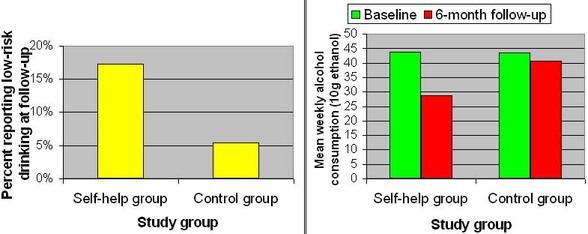The DRAM, Vol. 4(6) – Self-help(ful) or harmful?
The Internet is rife with self-help options for people dealing with addiction (e.g., Your First Step to Change). However, there is a danger in utilizing self-help programs that researchers have not tested. Untested programs could make things better; however, these programs also might make matters worse, do nothing, or mitigate problems for someone seeking help from addiction. This week, the DRAM examines a recent study by Riper et al. (2008) of an online self-help program for people in the general public who consume high levels of alcohol.
Researchers recruited via national publications and online health websites 335 adults who had Internet access, drank in excess of Dutch guidelines for low-risk drinking and were not currently seeking treatment for problem drinking. After excluding participants for several exclusion criteria (e.g., low risk drinking), researchers randomly assigned 261 participants who self-reported excessive1 or hazardous2 drinking patterns to either the treatment group, with access for 6 weeks to the self-help program and peer discussion group, or the control group, with access to an online educational brochure that required about ten minutes to read. Riper and colleagues assessed problem drinking at baseline and again at a 6-month follow-up, retaining 58% of participants. They used the weekly recall (Lemmens, Knibbe, & Tan, 1988) to measure mean alcohol consumption per week and the Quantity-Frequency Variability Index (Lemmens, Tan, & Knibbe, 1992) to measure the number of units per day per week consumed by participants.

Figure. Left: Success rate of adherence to low-risk drinking guidelines as reported at 6-month follow-up. Right: Change in average weekly alcohol consumption from baseline to 6-month follow-up. Click image to enlarge.
At 6-month follow-up 17.2% of the self-help group significantly reduced their drinking to within guideline norms compared to 5.4% for the control group (OR 3.66 95% CI 1.3-10.8, p = 0.006) (see Figure). The self-help group also decreased their mean weekly alcohol consumption 12 standard units significantly more than the control group (t(570.5) = 4.40, p<.001. The groups had similar consumption rates at baseline.
There are several important limitations to this study. The low response rate at 6-month follow-up raises concerns about selection bias. It is possible that people who completed the survey were more successful at changing their drinking behavior and because of that decided to complete the follow-up. This would lead to a significant difference between the groups that otherwise might not exist. Also, because the measures used in this study were limited to alcohol, it is unclear whether participants who attempted self-help might have taken part in other substance use or other risky behaviors. Finally, the data collected are self-report, which might lead to errors in reporting alcohol consumption.
Despite these limitations, the results are promising. Online self-help programs that provide for active participation on the part of the participant might lead to positive outcomes with regard to alcohol use behavior. Self-help, provided on the Internet, is a cost-effective way to provide a large audience with strategies for reducing addictive behavior. Additional research will help determine the limits of online self-help.
—John H. Kleschinsky
What do you think? Please use the comment link below to provide feedback on this article.
Notes
1. Excessive Drinking: Men > 21 units per week; women > 14 units per week. A unit represents 10 g of ethanol.
2. Hazardous Drinking: Men ≥ 6 units at least 1 day per week for the past 3 months; women ≥ 4 units at least 1 day a week for past 3 months.
A unit represents 10 g of ethanol.
References
Lemmens, P., Knibbe, R. A., & Tan, F. (1988). Weekly recall and dairy estimates of alcohol consumption in a general population survey. J Stud Alcohol, 49(2), 131-135.
Lemmens, P., Tan, E. S., & Knibbe, R. A. (1992). Measuring quantity and frequency of drinking in a general population survey: a comparison of five indices. J Stud Alcohol, 53(5), 476-486.
Riper, H., Kramer, J., Smit, F., Conijn, B., Schippers, G., & Cuijpers, P. (2008). Web-based self-help for problem drinkers: a pragmatic randomized trial. Addiction, 103(2), 218-227.